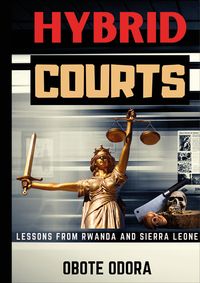
Hybrid Courts
Hybrid Courts: Lesson from Rwanda Sierra Leone is an original and provocative book. It provides stimulating perspectives on the drafting of Common Article 3 of the four Geneva Conventions, and Additional Protocol II of 1977, the governing law regulating non-international armed conflicts (NAIC). The enigmatic provisions governing the prosecutions of perpetrators, on the one hand, and protections of civilians in NIAC, on the other hand, are now being interpreted by important decisions of the International Criminal Tribunal for Rwanda (ICTR) and Special Court for Sierra Leone (SCSL)..
In the book, Dr Obote Odora focuses on the judicial interpretation of Common Article 3 and Additional Protocol II of 1977, relying on the preparatory works, and debates at the Diplomatic Conference of State parties at the adoption of the Convention and the Additional Protocol. With Respect to the Hybrid Courts, the author acknowledges the unequal and under- representation of African States at the Security Council, the all powerful United Nations organ that created the Hybrid Courts: the ICTR and the SCSL.
Utgiven: 2021
ISBN: 9789185803385
Förlag: Freedom World Publishers
Format: Häftad
Språk: Engelska
Sidor: 493 st
Hybrid Courts: Lesson from Rwanda Sierra Leone is an original and provocative book. It provides stimulating perspectives on the drafting of Common Article 3 of the four Geneva Conventions, and Additional Protocol II of 1977, the governing law regulating non-international armed conflicts (NAIC). The enigmatic provisions governing the prosecutions of perpetrators, on the one hand, and protections of civilians in NIAC, on the other hand, are now being interpreted by important decisions of the International Criminal Tribunal for Rwanda (ICTR) and Special Court for Sierra Leone (SCSL)..
In the book, Dr Obote Odora focuses on the judicial interpretation of Common Article 3 and Additional Protocol II of 1977, relying on the preparatory works, and debates at the Diplomatic Conference of State parties at the adoption of the Convention and the Additional Protocol. With Respect to the Hybrid Courts, the author acknowledges the unequal and under- representation of African States at the Security Council, the all powerful United Nations organ that created the Hybrid Courts: the ICTR and the SCSL.
Begagnad bok (0 st)
Varje vecka tillkommer tusentals nya säljare. Bevaka boken så får du meddelande när den finns tillgänglig igen.



